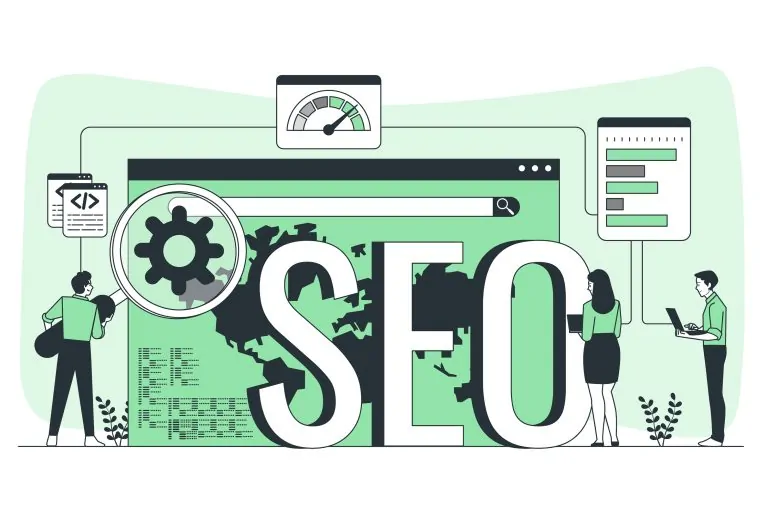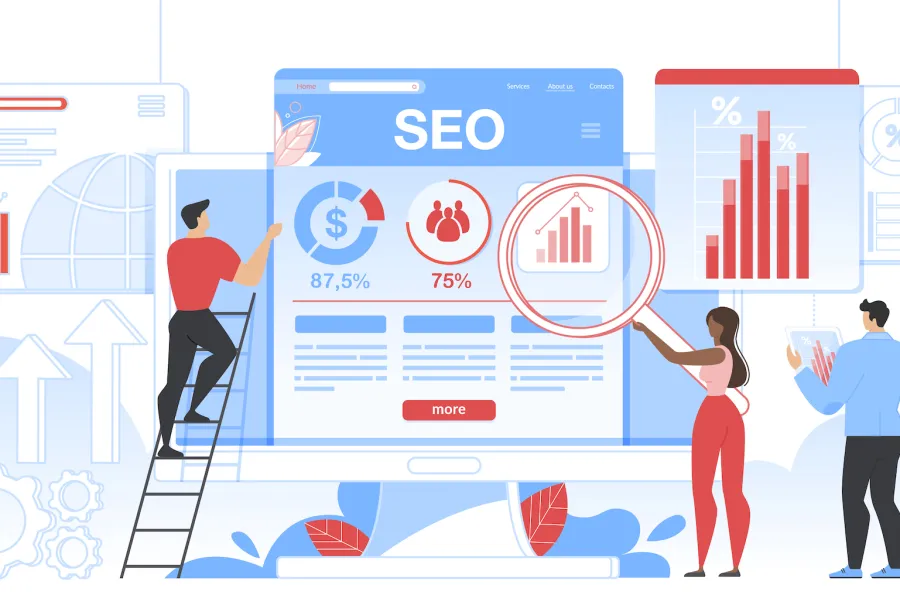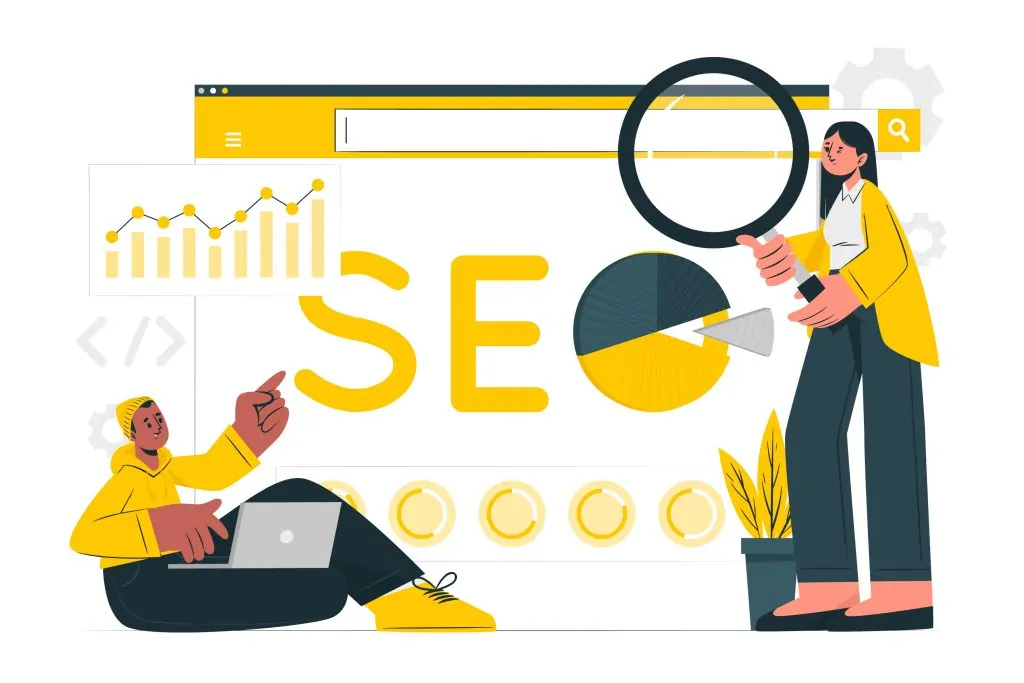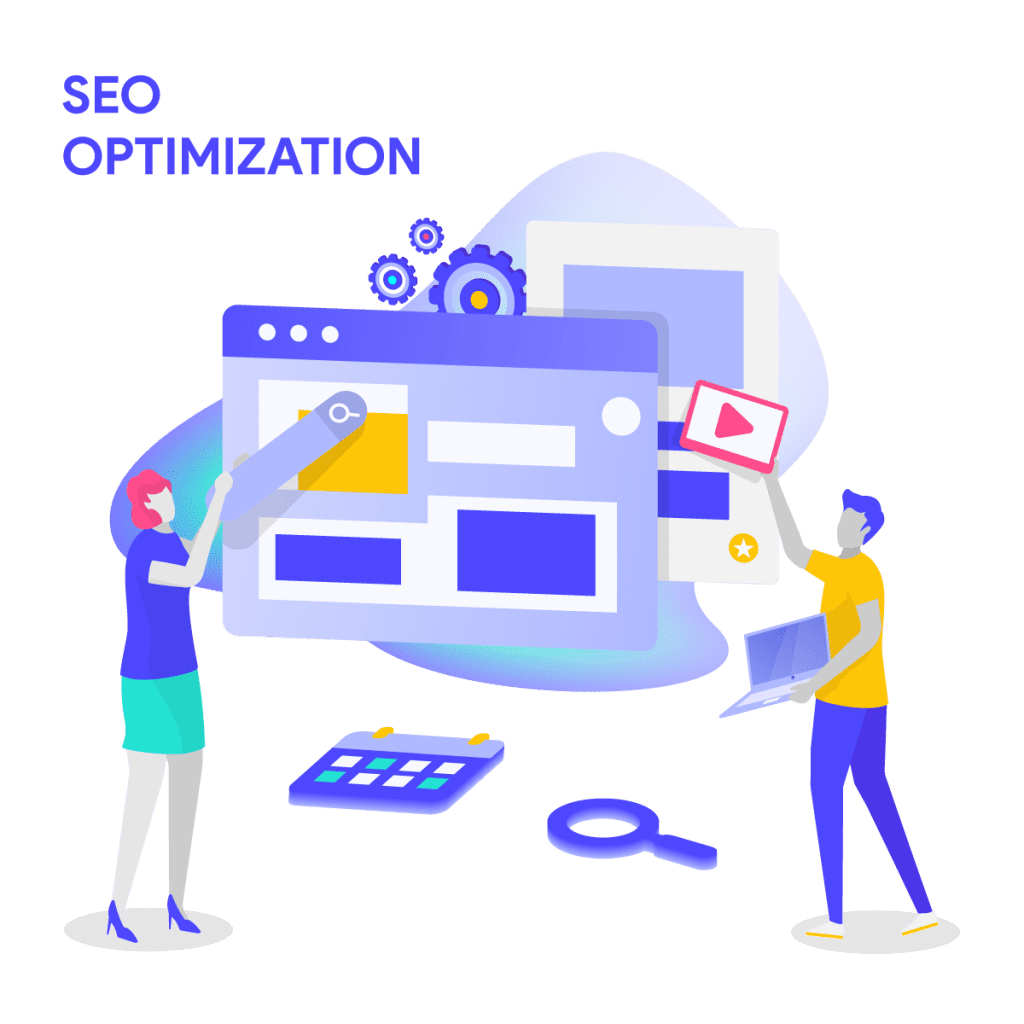
SEO is crucial for businesses. Why? Because it helps you rank higher on search engines. Moreover, it drives organic traffic to your website. This traffic is invaluable for businesses. With good SEO, you can turn your website into an advertising machine. Furthermore, it helps you target the right audience. So, let’s dive into the world of SEO.

Search Engine Optimization, commonly known as SEO, is an essential component for any website or online business looking to gain traction and succeed in the competitive digital landscape. In this article, we’ll explore the definition of SEO, its importance in the digital world, and how Nox Agency can help you optimize your website for search engines.
SEO stands for Search Engine Optimization, which is the practice of optimizing your website to rank higher on search engines like Google, Bing, and Yahoo. The primary goal of SEO is to increase your website’s visibility by improving its position in organic search results. This, in turn, drives more traffic to your site and potentially leads to more conversions and increased revenue.
Understanding the various components of SEO is crucial to achieving success in the digital realm. Here are some key aspects of SEO that you should be familiar with:
Keywords: These are the words and phrases that users type into search engines when looking for information or services. Selecting the right keywords for your website helps search engines understand what your site is about and rank it accordingly.
On-Page SEO: This refers to the optimization of individual web pages on your site. On-page SEO includes optimizing title tags, meta descriptions, headings, and content to ensure that your website is easily understood by search engines.
Off-Page SEO: Off-page SEO encompasses efforts made outside of your website to improve its search engine rankings. This includes tactics such as link building, social media marketing, and influencer outreach.
Technical SEO: This aspect of SEO focuses on optimizing your website’s technical elements, such as site speed, mobile responsiveness, and proper indexing, to ensure that search engines can crawl and index your site efficiently.










If you’re interested in SEO optimization for your blog or business, Nox Agency is among the best SEO companies that can help you achieve your goals. Our experienced team of SEO experts will work with you to create a customized strategy that addresses your website’s unique needs and objectives. We offer a range of SEO services, including:
With our comprehensive SEO approach, Nox Agency can help you unlock the door to online success, enhancing your website’s visibility, driving more traffic, and ultimately increasing your revenue.
Search Engine Optimization (SEO) has become an indispensable tool for businesses and website owners alike. By implementing effective SEO strategies, you can leverage a multitude of benefits that not only improve your website’s performance but also contribute to the overall growth and success of your business. Some of the most significant advantages of SEO include:
Cost-effective marketing: SEO drives organic traffic to your website, reducing the need for paid advertising and lowering your overall marketing costs.
Targeted audience: By optimizing your content for specific keywords and phrases, you can attract visitors who are genuinely interested in your products or services, leading to higher conversion rates.
Sustainable growth: With continuous investment in SEO, your website can experience steady growth in organic traffic, which translates to increased revenue and business expansion.
Enhanced website usability: SEO involves optimizing your website’s layout, design, and navigation, leading to a more user-friendly experience for your visitors.
Relevant content: SEO encourages the creation of high-quality, informative content that meets the needs of your target audience, boosting user satisfaction and engagement.
Mobile-friendliness: A crucial aspect of SEO is ensuring your website is optimized for mobile devices, offering a seamless browsing experience for users across all platforms.
Increased trust and authority: Websites that rank highly on search engines are often perceived as more credible and trustworthy by users, helping to build your brand’s reputation and authority.
Positive online presence: A well-optimized website can generate positive reviews, social media mentions, and backlinks, all of which contribute to a strong online presence for your brand.
Long-term brand recognition: As your website continues to rank highly for relevant search terms, your brand becomes more easily recognizable to your target audience, solidifying your position within your industry.
Higher quality leads: By attracting targeted traffic through SEO, your website can generate more high-quality leads that are likely to convert into paying customers.
Increased conversion rates: Optimized websites often feature clear calls-to-action and user-friendly design, which encourages visitors to take desired actions, such as making a purchase or subscribing to a newsletter.
Improved ROI: With more leads and conversions, your business can experience a higher return on investment (ROI) for your SEO efforts, justifying the expense and time invested in optimizing your website.
Effective SEO strategies can catapult your business to the first page of Google, significantly enhancing visibility and driving organic growth. By investing in SEO, you can reap the rewards of increased visibility, higher organic traffic, an improved user experience, greater brand credibility, and more leads and conversions. This comprehensive approach to digital marketing not only benefits your website’s performance but also contributes to the long-term success and growth of your business. Embracing SEO as a cornerstone of your online marketing strategy is essential in today’s competitive digital landscape.



Search Engine Optimization (SEO) can be categorized into three primary types, each focusing on different aspects of your website and online presence. By strategically combining these three types, you can achieve comprehensive SEO optimization that yields significant benefits for your website and business. The three main types of SEO are:

On-Page SEO refers to the optimization of individual web pages to improve their search engine rankings and attract more organic traffic. This type of SEO focuses on the content and HTML source code of each page. Key aspects of On-Page SEO include:
Keyword research: Identifying relevant and high-performing keywords to target within your content, ensuring it appeals to your target audience and search engines alike.
Meta tags: Crafting informative and engaging meta titles and descriptions that accurately represent the content of each page, improving click-through rates from search engine results pages (SERPs).
Header tags: Using header tags (H1, H2, H3, etc.) to structure your content and provide a clear hierarchy, making it easier for search engines to understand your content and improving user readability.
Internal linking: Establishing a strong internal linking structure that connects related pages within your website, enhancing navigation and distributing link equity throughout the site.
Image optimization: Ensuring images are properly formatted, compressed, and include descriptive alt text to improve page load speed and accessibility for visually impaired users.
Off-Page SEO involves optimizing external factors that influence your website’s search engine rankings. This type of SEO primarily focuses on building the authority of your domain through backlinks and other external signals. Key aspects of Off-Page SEO include:
Acquiring high-quality, relevant backlinks from authoritative websites to demonstrate the credibility and trustworthiness of your content to search engines.
Promoting your content on social media platforms to increase brand visibility, drive traffic, and potentially generate more backlinks.
Optimizing your website and online presence for local searches, ensuring that users in your target geographic area can easily find your business.
Collaborating with industry influencers and bloggers to amplify your content and potentially secure valuable backlinks and mentions.
Technical SEO encompasses the optimization of your website’s technical elements to ensure that search engines can effectively crawl, index, and render your content. This type of SEO focuses on improving site performance, security, and overall user experience. Key aspects of Technical SEO include:
Site speed: Optimizing your website’s load times by implementing techniques such as browser caching, minification, and image optimization to improve user experience and search engine rankings.
Mobile-friendliness: Ensuring that your website is responsive and optimized for mobile devices, providing a seamless browsing experience for users across all platforms.
Site architecture: Designing a logical and user-friendly site structure that enables search engines to easily crawl and index your content.
XML sitemaps: Creating and submitting an XML sitemap to search engines, making it easier for them to discover and index your web pages.
HTTPS and security: Implementing secure protocols such as HTTPS to protect user data and demonstrate to search engines that your website is a safe and trustworthy destination for users.
Structured data: Utilizing structured data markup (such as schema.org) to provide search engines with additional information about your content, potentially resulting in enhanced search engine results and improved click-through rates.
Indexability: Ensuring that your website’s important pages are indexable by search engines, while correctly managing noindex and canonical tags to avoid duplicate content issues.
Broken links and redirects: Regularly checking for and fixing broken links and implementing proper redirects when necessary, to maintain a healthy site structure and user experience.
A well-rounded SEO strategy incorporates all three types of SEO – On-Page, Off-Page, and Technical – to achieve optimal results. By combining these techniques, you can ensure that your website’s content, online presence, and technical aspects are all working harmoniously to improve your search engine rankings and drive organic traffic. Investing in a comprehensive SEO approach will not only boost your website’s performance but also contribute to the long-term growth and success of your business.
Are you wondering how SEO works? At its core, SEO encompasses the optimization of your website’s content and structure to make it more appealing to search engines, as well as the promotion of your website to enhance its online authority. By implementing effective SEO strategies, you can increase the likelihood of appearing on the first page of Google and other search engines. Let’s dive deeper into the mechanics of SEO:

Creating high-quality, engaging, and relevant content is a crucial aspect of SEO. The goal is to provide valuable information that meets the needs of your target audience, while also ensuring that search engines can easily understand and index your content. Optimizing the structure of your website involves organizing pages and sections in a logical and user-friendly manner, which aids in both search engine crawling and overall user experience. This includes the proper use of header tags, descriptive URLs, and a well-structured navigation menu.
Keyword research is an essential component of SEO, as it helps you identify the search terms your target audience is using to find products or services like yours. By strategically incorporating these keywords into your content, you can increase your website’s relevance for those search queries. Proper keyword optimization also involves using related terms, synonyms, and long-tail keywords to provide a comprehensive and natural representation of your topic.
Technical SEO focuses on improving the technical aspects of your website, such as site speed, mobile-friendliness, and security. This ensures that search engines can effectively crawl, index, and render your content, while also providing a seamless user experience. Technical SEO includes optimizing your website’s load times, implementing responsive design for mobile devices, and ensuring that your website follows best practices for HTTPS and data protection.
Off-Page SEO involves optimizing external factors that influence your website’s search engine rankings. This primarily includes building the authority of your domain through backlinks, social media marketing, and other promotional activities. By increasing your website’s online authority, you demonstrate to search engines that your content is credible, trustworthy, and worthy of high rankings.
Understanding and implementing the mechanics of SEO can significantly enhance your website’s performance and search engine rankings. By optimizing your website’s content, structure, technical aspects, and online authority, you can effectively attract more organic traffic and ultimately achieve long-term success for your business.
Several essential factors impact your website’s SEO ranking, and understanding these factors is crucial for optimizing your website and achieving higher search engine results. Some of the most important factors are as follows:
Providing high-quality, relevant content is the foundation of any successful SEO strategy. Your content should be engaging, informative, and tailored to your target audience’s needs and preferences. By producing valuable content that addresses the search intent of your audience, you can enhance your website’s search engine rankings and attract more organic traffic.
As more and more users access the internet through their mobile devices, ensuring that your website is mobile-friendly has become increasingly important. A responsive design that adapts to various screen sizes and provides a seamless user experience across different devices can significantly improve your website’s SEO ranking.
Website loading speed is a critical factor that affects both user experience and search engine rankings. A fast-loading website is more likely to retain visitors, while a slow-loading site can result in higher bounce rates and lower rankings. To improve your website’s loading speed, consider optimizing images, implementing caching, and minimizing the use of scripts and plugins.
Having a strong backlink profile is essential for SEO, as it demonstrates to search engines that your website is a credible and authoritative source of information. Acquiring high-quality, relevant backlinks from reputable websites can significantly improve your website’s search engine rankings. Focus on building relationships within your industry and producing share-worthy content to attract valuable backlinks.
A positive user experience is crucial for retaining visitors and improving your website’s search engine rankings. Factors that contribute to a good user experience include easy navigation, a clear site structure, and a visually appealing design. By optimizing your website’s user experience, you can encourage visitors to spend more time on your site and engage with your content, which can lead to higher rankings and increased organic traffic.
Addressing these key factors is essential for improving your website’s performance in search engine results. By focusing on creating high-quality content, ensuring mobile-friendliness, optimizing loading speed, building a strong backlink profile, and enhancing user experience, you can achieve higher search engine rankings and drive more organic traffic to your website.
On-page optimization is a vital aspect of SEO that focuses on your website’s content and structure. By optimizing various on-page elements, you can create a strong foundation for your website’s SEO performance. The key elements of on-page SEO include:
Conducting thorough keyword research enables you to identify the search terms your target audience uses to find information, products, or services related to your niche. By strategically incorporating these keywords into your content, you can improve your website’s relevancy and visibility in search engine results. Remember to use keywords naturally and avoid keyword stuffing, which can negatively impact your rankings.




Title tags and meta descriptions are essential HTML elements that provide a brief overview of your webpage’s content. They appear in search engine results pages (SERPs) and play a crucial role in attracting users to click on your link. Crafting compelling, keyword-rich title tags and meta descriptions can improve your click-through rates and boost your website’s search engine rankings.
Using heading tags (H1, H2, H3, etc.) to structure your content allows search engines to better understand the hierarchy and organization of your webpage. Proper use of heading tags also enhances the readability of your content, making it more accessible and user-friendly for your website visitors.
An optimized URL structure is important for both search engines and users. Creating descriptive, keyword-rich URLs that accurately represent your content helps search engines understand your pages’ purpose and improves your website’s overall search engine rankings. Additionally, user-friendly URLs make it easier for visitors to navigate and share your content.
Establishing a strong internal linking structure connects related pages within your website and enhances navigation for users. Furthermore, internal linking distributes link equity throughout your site, improving the search engine rankings of individual pages. By carefully planning and implementing internal links, you can create a more cohesive and user-friendly website experience.
Optimizing images on your website can significantly improve page load speed and overall user experience. Proper image optimization includes compressing images to reduce file size, using descriptive file names and alt text, and selecting the appropriate file format. By optimizing your images, you can enhance your website’s performance and make your content more accessible to both search engines and users.
Creating high-quality, engaging, and readable content is crucial for on-page SEO. Focus on producing well-written, informative content that addresses the needs and interests of your target audience. Additionally, ensure that your content is easy to read and understand by using clear language, short paragraphs, and relevant visuals. By prioritizing content quality and readability, you can provide a positive user experience, encourage visitors to stay longer on your site, and ultimately improve your search engine rankings.
Focusing on these key on-page optimization elements is essential for creating a strong foundation for your website’s SEO performance. By diligently addressing keyword research and usage, title tags and meta descriptions, heading tags, URL structure, internal linking, image optimization, and content quality and readability, you can enhance your website’s visibility, user experience, and search engine rankings. Remember that on-page optimization is just one aspect of a comprehensive SEO strategy, and it should be complemented by off-page and technical SEO efforts to achieve the best results.
Off-page optimization encompasses the actions taken outside of your website to improve its online reputation and authority. By focusing on various aspects of off-page SEO, you can increase your website’s credibility, which in turn can boost its search engine rankings. Some crucial aspects of off-page SEO are discussed below:
Backlinks, also known as inbound links, are an essential component of off-page SEO. They represent a “vote of confidence” from other websites, signaling to search engines that your content is valuable and trustworthy. Acquiring high-quality backlinks from reputable, relevant sources can greatly improve your website’s search engine rankings. To build a strong backlink profile, focus on creating valuable, shareable content and engaging in strategic link-building activities such as guest posting and collaborations with industry influencers.
Having an active presence on social media platforms can greatly enhance your website’s online reputation and authority. By sharing and promoting your content on social media channels, you can increase brand visibility, drive traffic to your website, and potentially earn additional backlinks. Engaging with your audience on social media can also help foster relationships with potential customers, influencers, and industry peers, further contributing to your website’s credibility.
Guest blogging involves contributing content to other websites within your industry or niche. This strategy can be an effective way to showcase your expertise, reach a larger audience, and earn valuable backlinks. When pursuing guest blogging opportunities, focus on creating high-quality content that provides value to the host website’s audience while also aligning with your own brand and objectives.
Collaborating with influencers in your industry can help amplify your content and boost your website’s authority. Influencers typically have large, engaged audiences and can provide valuable exposure for your brand. By partnering with influencers for content creation, promotions, or endorsements, you can potentially secure valuable backlinks, social media shares, and increased brand awareness.
Local SEO focuses on optimizing your website and online presence for local searches, ensuring that users in your target geographic area can easily find your business. Building and maintaining accurate, consistent citations on local business directories and review sites can help improve your website’s visibility in local search results. This not only drives targeted traffic to your website but also strengthens your online reputation and authority within your local market.
Technical SEO focuses on optimizing the backend aspects of your website to ensure search engines can access, crawl, and index your content efficiently. By addressing these technical components, you can create a solid foundation for your website’s overall SEO strategy. Some of the key components of technical SEO are highlighted below:
Website speed is a crucial factor that affects both user experience and search engine rankings. A fast-loading website is more likely to retain visitors and rank higher in search results. To optimize your website’s speed, consider compressing images, leveraging browser caching, minifying CSS, JavaScript, and HTML files, and reducing server response time.
With the increasing number of mobile users, it’s essential to ensure your website is optimized for mobile devices. A mobile-friendly website provides a seamless user experience across various screen sizes and devices. Implementing responsive design, optimizing images and fonts for mobile, and using mobile-friendly navigation can significantly improve your website’s mobile optimization and search engine rankings.
Search engines prioritize websites with secure connections, such as HTTPS, as they provide an added layer of security for users. Migrating your website to HTTPS not only enhances user trust and data protection but can also positively impact your search engine rankings. Acquiring an SSL certificate and implementing proper redirects from HTTP to HTTPS are key steps in achieving a secure connection for your website.
An XML sitemap is a roadmap that helps search engines navigate and index your website more efficiently. By providing a clear and up-to-date sitemap, you enable search engines to quickly discover new and updated content on your website. Regularly updating your XML sitemap and submitting it to search engines can improve your website’s crawlability and search engine rankings.
Structured data markup, such as schema.org, provides search engines with additional information about your content, potentially leading to enhanced search engine results and improved click-through rates. Implementing structured data markup can help search engines better understand your content and provide users with more relevant and informative search results, ultimately boosting your website’s visibility and traffic.
Properly handling 404 errors (broken or missing pages) is essential for maintaining a healthy site structure and user experience. Regularly monitoring your website for broken links and implementing appropriate redirects can prevent users from encountering frustrating dead ends and improve your website’s overall performance in search engine rankings.
Canonical tags help search engines understand which version of a page should be considered the original or preferred version, preventing duplicate content issues that can negatively impact your website’s SEO. Implementing canonical tags on your website can ensure search engines index the correct version of a page, consolidate ranking signals, and avoid potential penalties due to duplicate content.
Technical SEO is a critical aspect of your website’s overall search engine optimization strategy. By focusing on key components such as website speed optimization, mobile optimization, secure connections, XML sitemaps, structured data markup, 404 error handling, and canonical tags, you can create a strong foundation for your website’s performance in search engine results. By addressing these technical elements, you can ensure your website is fully optimized for search engines, leading to improved visibility, higher rankings, and increased organic traffic.
There are numerous SEO tools available that can help you optimize your website and monitor its performance in search engine rankings. These tools provide valuable insights into various aspects of your website’s SEO performance and can help you identify areas for improvement. Some of the most popular and widely used SEO tools are discussed below:

Google Analytics is a powerful, free tool that allows you to track and analyze your website’s traffic. With Google Analytics, you can monitor key metrics such as organic traffic, bounce rate, and user engagement, helping you understand how well your website is performing in terms of attracting and retaining visitors. Additionally, Google Analytics offers insights into user demographics, behavior, and preferences, enabling you to tailor your content and marketing strategies to better meet the needs of your target audience.
Google Search Console is another free tool provided by Google that helps website owners monitor and maintain their website’s presence in Google search results. This tool provides invaluable information about your website’s crawlability, indexation, and overall search performance. By using Google Search Console, you can identify and fix technical issues, submit sitemaps, and monitor your website’s search queries and rankings, all of which contribute to a stronger SEO strategy.
SEMrush is a comprehensive, all-in-one SEO tool that offers a wide range of features, including keyword research, site audit, backlink analysis, and competitor analysis. With SEMrush, you can identify valuable keyword opportunities, analyze your website’s performance, and uncover your competitors’ strategies to stay ahead in the ever-evolving world of SEO. This versatile tool can be a valuable asset in optimizing and monitoring your website’s search engine performance.
Ahrefs is a powerful SEO tool with an extensive backlink index and numerous features for keyword research, content analysis, and technical SEO. Ahrefs enables you to analyze your website’s backlink profile, identify and fix technical issues, and discover new keyword opportunities to target. With its comprehensive set of features, Ahrefs can help you fine-tune your website’s SEO strategy and enhance its overall performance in search engine rankings.
Moz Pro is an all-inclusive SEO suite that provides a wide array of tools and resources for keyword research, site audits, rank tracking, and backlink analysis. With Moz Pro, you can gain insights into your website’s SEO performance and uncover areas for improvement. Additionally, Moz Pro offers a user-friendly interface and a wealth of educational resources, making it a great option for both beginners and seasoned SEO professionals.
Screaming Frog is a popular website crawler that helps you analyze and optimize your website’s technical aspects. This tool enables you to identify broken links, duplicate content, missing title tags, and other technical issues that can negatively impact your website’s SEO performance. By using Screaming Frog, you can quickly pinpoint and address technical issues, ensuring that your website’s structure and content are fully optimized for search engines.
Yoast SEO is a widely-used plugin for WordPress websites that offers a comprehensive suite of on-page SEO optimization tools. With Yoast SEO, you can easily optimize your content for target keywords, improve your meta descriptions and title tags, and create XML sitemaps. Additionally, Yoast SEO offers readability analysis and suggestions, ensuring that your content is not only optimized for search engines but also user-friendly and engaging for your audience.
In summary, there are a variety of SEO tools available to help you optimize your website and monitor its performance in search engine rankings. Tools such as Google Analytics, Google Search Console, SEMrush, Ahrefs, Moz Pro, Screaming Frog, and Yoast SEO can provide valuable insights into your website’s SEO performance and help you identify areas for improvement. By leveraging these tools, you can fine-tune your website’s SEO strategy, enhance its visibility in search engine results, and ultimately drive more organic traffic and conversions.
To achieve the best results, it’s essential to follow tried-and-true SEO strategies and best practices. Some of the most effective strategies include:
By implementing these strategies, you can boost your website’s SEO performance and achieve long-term success.
SEO is an ever-evolving field, and it’s crucial to stay up-to-date with the latest trends and best practices. To expand your SEO knowledge, consider:
Moreover, partnering with a top SEO company like Nox Agency can help you navigate the complexities of SEO and ensure your website’s success in search engine rankings.
SEO is a powerful advertising machine that can propel your business to new heights. By understanding its various aspects and working with an expert team like Nox Agency, you can unlock the full potential of SEO and enjoy the numerous benefits it offers. Don’t wait any longer – invest in SEO optimization today and transform your online presence for the better.
In the competitive world of online marketing, every advantage counts. Partnering with Nox Agency for your SEO needs not only gives you access to top-notch optimization services but also empowers your business to stay ahead of the curve. With Nox Agency by your side, you can:
When it comes to selecting the right partner for your SEO journey, Nox Agency stands out among the best SEO companies. Here are some reasons why you should choose Nox Agency for your SEO optimization needs:
Expertise
Nox Agency’s team consists of experienced SEO professionals who stay current with industry trends and best practices, ensuring top-notch service for your business.
Customized Solutions
Nox Agency understands that every business is unique and requires tailored SEO strategies to achieve optimal results. They work closely with clients to develop customized solutions that address specific needs and goals.
Transparent Reporting
Nox Agency believes in full transparency and provides regular, comprehensive reports on your website’s SEO performance, allowing you to track progress and make informed decisions.
Proven Track Record
Nox Agency has a proven track record of helping businesses achieve higher search engine rankings and drive more organic traffic, leading to increased leads and conversions.
Holistic Approach
Nox Agency adopts a holistic approach to SEO, incorporating on-page, off-page, and technical SEO strategies to ensure comprehensive optimization and long-lasting results.
By choosing Nox Agency, you’re investing in a dedicated team of SEO experts who will work tirelessly to help your website rank higher on search engines and achieve online success.
Don’t just take our word for it – see what Nox Agency’s satisfied clients have to say about their experiences:
“Working with Nox Agency has been a game-changer for our business. Their SEO expertise has helped us rank higher on Google, and the increase in organic traffic has led to a significant boost in sales. The Nox Agency team is professional, responsive, and genuinely invested in our success. We couldn’t be happier with the results.” – John D., Small Business Owner
“As a blogger, I was struggling to attract readers to my site. Nox Agency’s comprehensive SEO strategy transformed my online presence, and now I’m ranking on the first page of Google for several key terms. The increase in traffic has been incredible, and I’m so grateful for the support and guidance Nox Agency provided along the way.” – Sarah L., Blogger
As search engines continue to evolve, it’s essential to stay current with the latest SEO trends and best practices. Nox Agency is committed to staying at the forefront of the industry, ensuring your website remains optimized and competitive in the ever-changing digital landscape.
By choosing Nox Agency as your SEO partner, you’ll have the peace of mind knowing that your website is in capable hands – now and in the future.
With a deep understanding of SEO optimization and a proven track record of success, Nox Agency is the ideal partner for businesses and individuals looking to rank higher on search engines and drive organic growth. Don’t let your competitors get ahead – act now and secure your business’s online success by partnering with Nox Agency.
Contact Nox Agency today to get started on your journey toward SEO success. Let their team of experts guide you through the complexities of SEO optimization and transform your online presence for the better. The future of your business depends on making the right choice – and Nox Agency is here to help you achieve your online goals.
Still have questions about SEO optimization and how Nox Agency can help? Here are some frequently asked questions and their answers to help you better understand the process:
A: SEO is a long-term strategy, and results may not be immediate. Typically, it takes several months to start seeing improvements in search engine rankings and organic traffic. However, the timeline varies depending on your industry, competition, and the quality of your existing website.
A: No SEO company can guarantee specific rankings, as search engine algorithms are constantly evolving and competitors are also working to improve their SEO. However, Nox Agency has a proven track record of helping clients achieve higher rankings and increased organic traffic.
A: Yes, Nox Agency provides a range of digital marketing services, including content marketing, social media management, and pay-per-click (PPC) advertising. By offering a comprehensive suite of services, Nox Agency can help you develop a well-rounded online marketing strategy.
A: The cost of SEO services at Nox Agency depends on various factors, such as the size of your website, your industry, and your specific needs. To get a customized quote, contact Nox Agency and provide details about your business and goals.
A: Nox Agency provides regular, transparent reports on your website’s SEO performance, including updates on keyword rankings, organic traffic, and other key metrics. Additionally, they are always available to answer your questions and address any concerns you may have throughout the process.
References:
Research article
Search engine optimization: The long-term strategy of keyword choice
Research article
Keyword Selection Strategies in Search Engine Optimization
How Relevant is Relevance?
Journal of Retailing 27 December 2020
Mayank Nagpal
J. Andrew Petersen